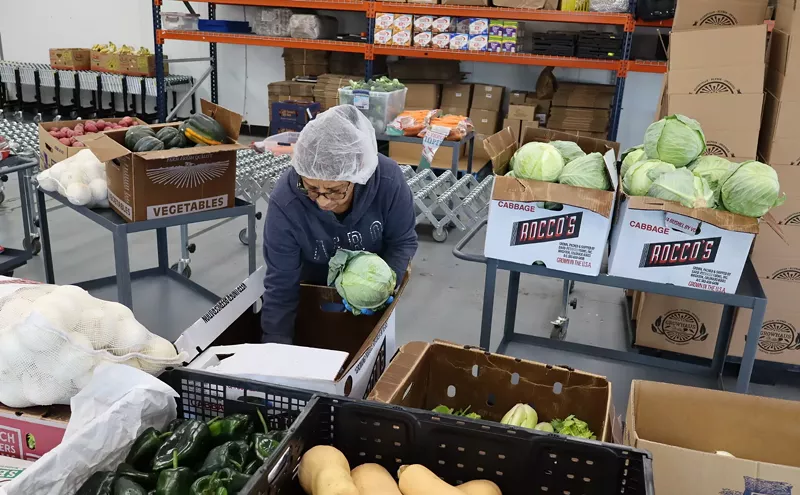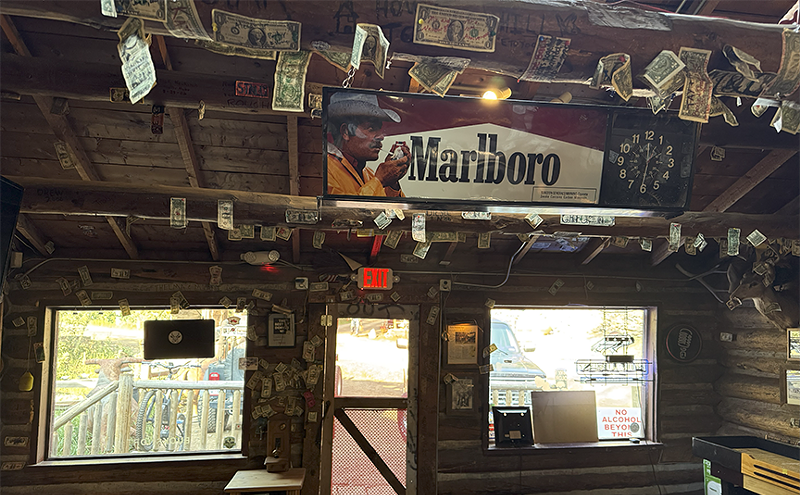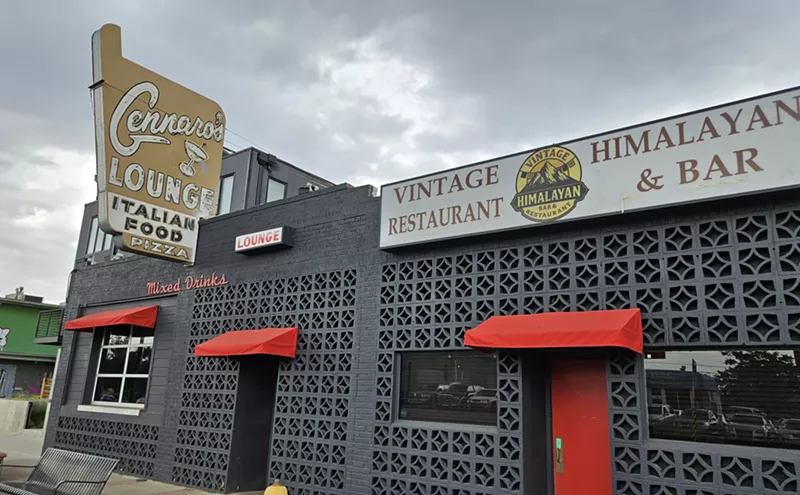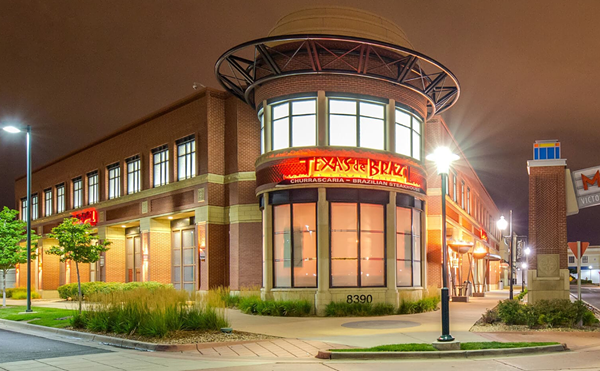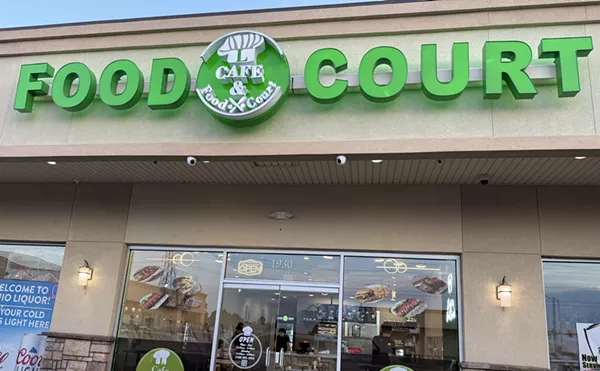Wayne Adams doesn't like to talk about the ghosts, the apparitions dressed in seventeenth-century period garb that haunt the Capitol Hill corner store that's been in his family for 38 years. "They get more active when you talk about it," he says matter-of-factly, detailing the rows of Shurfine brand canned goods and penny candy that shoot off the shelves without prompting, the honey bears that arrange themselves in circular patterns overnight, the faucet that turns itself on early in the morning and floods the storage room. "They're very playful."
Eva Adams, his wife of sixteen years, doesn't believe a word of it, thinks it's all in Wayne's head. Never mind that shortly after the passing of Leroy Simmons, Wayne's uncle and the store's original owner, Eva repeatedly heard Leroy's signature nervous whistle coming from the front of the store, near the Discount Phone Cards dispenser and ATM. "If you ask her about that," Wayne explains, "all she'll say is 'Ssshhh!' She's very religious."
Ten years ago, recently laid off from his job at the phone company, Wayne used his pension and part of his 401K as the down payment to buy Kelly's Superette from his Aunt Shirley and Uncle Leroy for $150,000. He'd been working there part-time for the better part of seven years, just as his mother had years before. In 2002, the lease ran him $850 a month; on the first of April, Wayne cut the final rent check for the 1,900-square-foot space at 1201 East 13th Avenue for $1,450.
"We've had our cry," Wayne, 64, admits, his face flush, eyelids quivering ever so slightly. He coughs and composes himself. "It felt like a big loss," a loss that became inevitable when he was notified in 2010 that Unique Management Solutions, the building's new owner — and its fourth in ten years — would be nearly quadrupling the rent, to $5,000, when his ten-year lease was up. During the winter months, Wayne and Eva, 62, didn't even do $5,000 in sales.
In its heyday, though, Kelly's "did everything the big stores did, only on a smaller scale," Wayne remembers. Chicken, steak, pork chops, ground beef — even fresh produce and sandwiches. But short shelf lives, slim profit margins and minimum-order requirements from distributors gradually forced him to scale back: At the end, in addition to blocks of cheese, bologna and a couple of cartons of eggs, Wayne's fresh-food offerings were down to potatoes (99 cents a pound), onions ($1.89 a pound), single bananas, lemons and limes. He quit selling tomatoes a month ago. "I can't tell you how much money I lost on bread," he laments. Assuming it didn't spoil, he saw fourteen cents for every gallon of milk sold.
"We always tried to cater to customers' needs," Wayne says, often at the expense of profit. Customers needing cigarettes, soda, near beer, nail polish remover, Powerball tickets, plungers, baking soda, bandages, motor oil or microwaveable popcorn — they usually found what they needed at Kelly's. Then again, the real value of the mom-and-pop isn't measured in staples and sundries.
"We run tabs for folks who are in between jobs or waiting for unemployment checks," Wayne says, flipping through a small spiral-bound black notebook and shaking his head about the only tab he ever got burned on, for $200. "We buy the kids ice cream or Popsicles when they come in. We keep treats for our doggy friends. We call cabs for people who've had too much to drink." They even saved boxes for the movers and shakers of Denver's most transient neighborhood, something King Soopers down the street stopped doing years before.
Behind the counter, between a dusty wooden bookshelf and an increasingly empty cigarette case, hangs a watercolor painting by three-year-old regular Anne, who also brought Eva a mixed bouquet of flowers during the Superette's final days. Next to it, a photo of a white cocker spaniel with brown ears — Laddie, long gone — remains a tribute to all the friends they made over the years.
"Personal touches," Wayne mutters, lost in thought. "People are truly, sincerely going to miss this place. The majority of our customers feel endeared to the place after so many years. It's touching."
Indeed, the scene this Wednesday evening, five days before D-Day, is, in flashes, every bit as poignant as the receiving line at a Catholic wake:
"Thanks for always being so lovely and nice to Ollie," one woman says of her dog, who mostly goes by Bubba.
"I appreciate all of your service," says another. "This store has really been a cornerstone to the neighborhood."
"This is super-sad," pouts still another. "You've always been our favorite go-to."
Wayne smiles, shakes hands, comes around the counter for hugs. He greets all those he knows by name. "Hello, Daniel!" he bellows. "You playing ball tonight, Martin?" he asks. Ringo the dog gets a treat and an ear rub, Janis the human a pack of Newports because the Marlboro Menthols are sold out and won't be restocked. A customer in orange reflective sunglasses, a Kansas City Chiefs hat and a blue-and-white-striped sweater reports that he finally scored a job as a long-haul trucker. "Congratulations!" Wayne responds.
"I'm eating ham now instead of bologna," the customer quips.
"Pretty soon you'll be eating steaks!" Wayne counters.
During lulls, he sips black coffee from a Styrofoam cup and sneaks to the back room to pull from a half-smoked Tareyton cigarette at rest in a Camel ashtray. "Us Tareyton smokers would rather fight than switch!" went the slogan, popular in newspapers, magazines and television commercials during the '60s and '70s. He reminisces about the old neighborhood, before the closing of Cricket on the Hill next door in 2007 and Gabor's just across the alley in January, back when the dispensary on the corner of Marion was a head shop and Nicolo's was little more than a five-foot-long counter and standing room for a few — the days when neighboring slumlords offering weekly rentals and a pay phone on the corner meant prostitutes and their johns would come in for beers and the drug dealers for soda.
"Doctors, lawyers, ex-cons in ankle bracelets, prostitutes, pimps, drug dealers, tweakers — we've seen it all," he recalls. "This was the best show in town on a Saturday night. Colorful, so very colorful."
Before pouring all of their time and money into the Superette — throughout their run, Wayne and Eva kept one, maybe two other employees at a time; most familiar was Ron, an ex-con himself who started seven and a half years ago and has remained until the end — Wayne and Eva loved to dance: the jitterbug, swing, Mexican polka. They met in the early '90s at the now-shuttered Club 56 on North Washington. "It was a nice place to hang out and dance," Wayne remembers. He was there with a date; Eva was alone. Every time Wayne's date went to the bathroom, Eva came over to talk to him and ask him to dance. "She really wanted me," Wayne brags. That night, he left with his date, but a week later he returned without. They married after five years.
Now, sixteen years later, they might finally have the time to dance again. Before signing a new lease — maybe in Uptown? Definitely not on Colfax — Wayne says they'll probably take a few months off. Catch up on some movies. Ride their Schwinn cruiser bicycles together. "This place has really been our life," Wayne says. "It's the most fun job I've ever had. We've both really enjoyed it. And you know, we're not rich people. We're just working people. We just make a living, that's all."




